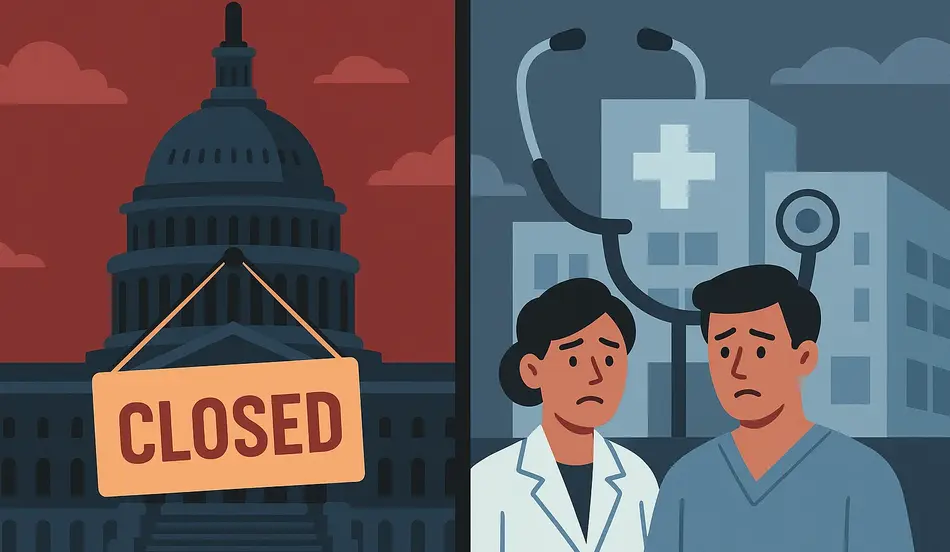Affordable Care Act tax credits extension has become the central battleground in Washington as Democrats push for critical healthcare funding while Republicans resist reversing recent Medicaid cuts. The political showdown centers on three key demands that could determine healthcare access for millions of Americans.
The healthcare policy debate has reached a critical juncture as Democrats demand action on three interconnected issues that total approximately $1.5 trillion in proposed spending. However, the real focus has narrowed to the Affordable Care Act tax credits extension, which represents the only area where bipartisan support appears possible. This targeted approach reflects the political reality that Republicans are unlikely to reverse their recent healthcare policy victories, making the tax credits the most viable path forward for maintaining healthcare affordability.
The Three-Pronged Democratic Healthcare Strategy
The strategy encompasses reversing recent Republican healthcare cuts, stopping White House funding rescissions, and extending critical tax credits that help millions of Americans afford health insurance.
The first component involves reversing the healthcare provisions included in the recent Republican mega bill, particularly the cuts made to Medicaid. Democrats argue that these cuts disproportionately affect vulnerable populations and undermine the healthcare safety net. However, this demand faces significant political resistance, as Republicans are unlikely to undo their recent legislative victories, especially so soon after their implementation.
The second element focuses on stopping what Democrats call “rescissions” – instances where the White House has declined to use funding that Congress allocated through bipartisan agreements. Democrats contend that these rescissions undermine the legislative process and prevent important programs from receiving their intended funding. This issue touches on broader questions about executive authority and congressional oversight in the federal budget process.
The third and most politically viable component centers on extending the premium tax credits that help Americans afford health insurance through the Affordable Care Act marketplace. These credits are set to expire at the end of the year, and their expiration would result in significantly higher healthcare costs for more than 20 million Americans, according to the Kaiser Family Foundation.
The Economic Impact of Tax Credit Expiration
The $350 billion estimated cost over ten years represents a significant investment in maintaining healthcare affordability, but the cost of inaction could be even greater.
When the tax credits expire, the immediate impact will be felt by millions of families who rely on these subsidies to make health insurance affordable. The Kaiser Family Foundation’s analysis suggests that without these credits, many Americans would face healthcare costs that consume a disproportionate share of their household income, potentially forcing difficult choices between healthcare and other essential needs.
The broader economic consequences extend to healthcare providers, insurance companies, and the overall healthcare system. A sudden increase in uninsured or underinsured Americans could strain emergency rooms and safety-net providers, while insurance companies might face adverse selection as healthier individuals drop coverage due to cost concerns.
The economic ripple effects also touch employment and productivity, as workers facing higher healthcare costs may need to make difficult career decisions or work additional hours to maintain coverage. This dynamic could affect labor market participation and economic mobility, particularly for lower-income workers who benefit most from the tax credits.
Political Dynamics and Bipartisan Challenges
While there is some bipartisan support for extending the tax credits, significant obstacles remain that could prevent a clean extension of the current program.
Both Democrats and Republicans have indicated that changes to the program will likely be necessary to secure passage. These modifications could include adding income caps to target the credits more precisely, implementing measures to address what lawmakers call “waste, fraud, and abuse,” or making other adjustments to improve program efficiency and reduce costs.
The political calculus becomes more complicated when considering the broader healthcare policy landscape. Republicans remain committed to their recent healthcare policy changes, particularly the Medicaid cuts that Democrats want to reverse. This creates a challenging environment where finding common ground requires careful negotiation and compromise.
The White House’s role in the process adds another layer of complexity, particularly regarding the rescission issue. While Congress may want to prevent future rescissions, the executive branch has significant discretion in how it implements and spends allocated funds, creating potential constitutional and practical challenges to congressional oversight.
Immigration and Healthcare Access Controversy
The debate centers on which groups of immigrants should have access to healthcare programs, including the premium tax credits that help make insurance affordable.
Current law generally prohibits undocumented immigrants from accessing Medicare, Medicaid, or the Affordable Care Act marketplace, and Democrats have acknowledged this limitation. However, the recent Republican healthcare bill narrowed access for certain groups of lawfully present immigrants, including refugees, those with temporary protected status, and individuals brought to the country as children who are now adults.
These groups represent what immigration law calls “lawfully present” individuals – people who are legally in the country, known to authorities, and not undocumented, but who may not be on a clear path to citizenship or have green cards. The Republican healthcare bill restricted their access to various healthcare programs, while Democrats want to restore and potentially expand access for these populations.
The immigration aspect of the healthcare debate reflects broader questions about who deserves access to public benefits and how immigration status should affect healthcare eligibility. These questions touch on fundamental values about inclusion, fairness, and the role of government in providing healthcare access.
Healthcare, Immigration, and Opportunity
The debate over immigrant access to healthcare highlights the need for professionals in policy, advocacy, and public health. Employers can make a difference by hiring experts ready to navigate complex issues of fairness, inclusion, and healthcare reform. Post your job on WhatJobs today and connect with candidates eager to shape the future of healthcare and immigration policy.
Post a Job Free for 30 Days →The Path Forward for Healthcare Policy
Affordable Care Act tax credits extension represents the most viable path forward for addressing healthcare affordability concerns, but success will require careful political navigation and compromise. The focus on tax credits reflects the political reality that broader healthcare reforms face significant obstacles in the current political environment.
The estimated $350 billion cost over ten years, while substantial, represents a more manageable investment compared to the full $1.5 trillion Democratic healthcare agenda. This targeted approach increases the likelihood of bipartisan support while still addressing the most critical healthcare affordability issues.
The need for program modifications, including income caps and fraud prevention measures, suggests that any successful extension will likely look different from the current program. These changes could actually improve the program’s effectiveness and political sustainability while addressing concerns about cost and efficiency.
The broader healthcare policy landscape will continue to evolve, with ongoing debates about Medicaid expansion, prescription drug costs, and healthcare system reform. The tax credits extension represents one piece of a larger puzzle, but it’s a piece that could provide immediate relief to millions of Americans while creating space for broader healthcare policy discussions.
Frequently Asked Questions
What is the Affordable Care Act tax credits extension and why is it important?
The Affordable Care Act tax credits extension refers to continuing the premium tax credits that help millions of Americans afford health insurance through the ACA marketplace. These credits are set to expire at the end of the year, and without extension, healthcare costs would increase significantly for over 20 million Americans.
How much would extending the Affordable Care Act tax credits cost?
Extending the Affordable Care Act tax credits as currently structured would cost approximately $350 billion over the next ten years. However, both parties are likely to make modifications to the program, including adding income caps and fraud prevention measures, which could reduce the overall cost.
Why are Republicans resistant to the Affordable Care Act tax credits extension?
While there is some bipartisan support for extending the tax credits, Republicans are generally opposed to the broader Democratic healthcare agenda, including reversing recent Medicaid cuts and stopping White House funding rescissions. The tax credits extension is the most politically viable component of the Democratic healthcare strategy.
What happens if the Affordable Care Act tax credits are not extended?
If the Affordable Care Act tax credits are not extended, more than 20 million Americans would face significantly higher healthcare costs when the credits expire at the end of the year. This could lead to increased uninsurance rates and strain on the healthcare system.
A Real-World Example: Sarah’s Healthcare Journey
Sarah Martinez, a 34-year-old small business owner from Phoenix, Arizona, represents the millions of Americans whose healthcare access depends on the Affordable Care Act tax credits extension. As a self-employed graphic designer, Sarah relies on the ACA marketplace for health insurance, and the premium tax credits make her coverage affordable.
“I pay about $200 per month for my health insurance, but without the tax credits, it would cost me over $600 per month,” Sarah explains. “That’s a huge difference for someone like me who doesn’t have employer-sponsored coverage. The tax credits literally make the difference between having health insurance and going without.”
Sarah’s situation highlights the real-world impact of the political debate in Washington. Her monthly premium of $200 is made possible by approximately $400 in monthly tax credits, which reduce her out-of-pocket costs significantly. Without these credits, she would face the difficult choice of paying more than she can afford or going without health insurance entirely.
“The uncertainty is really stressful,” Sarah says. “I’m trying to plan for next year, but I don’t know if I’ll be able to afford health insurance if the credits expire. It’s not just about me – it’s about my family’s health and financial security.”
Sarah’s story illustrates why the Affordable Care Act tax credits extension has become such a critical issue in Washington. For millions of Americans like Sarah, these credits represent the difference between affordable healthcare and financial hardship, making the political debate more than just numbers and policy – it’s about real people’s lives and wellbeing.




